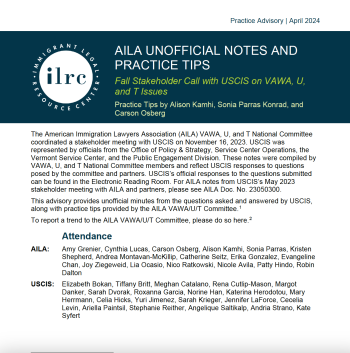Term Page
U Visa/T Visa/VAWA 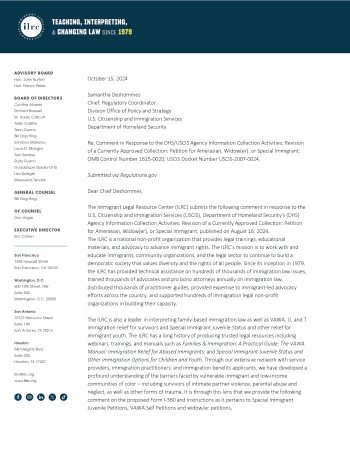
On October 15, 2024, the ILRC submitted a comment on the proposed changes to Form I-360, encouraging USCIS to increase the accessibility of the form for pro se respondents, including Special Immigrant Juvenile Status Applicants and VAWA self-petitioners.
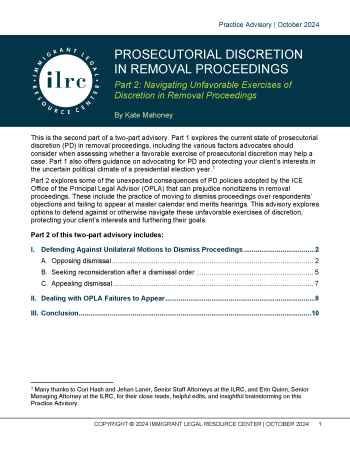
Part 2 of this 2-part advisory explores some of the unexpected consequences of PD policies adopted by the ICE Office of the Principal Legal Advisor (OPLA) that can prejudice noncitizens in removal proceedings, including the practice of moving to dismiss proceedings over respondents’ objections and failing to appear at hearings.
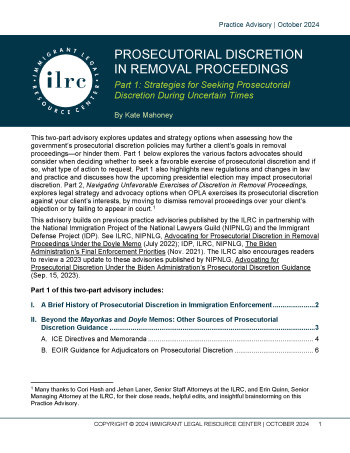
Part 1 of this 2-part advisory provides updates on DHS’s prosecutorial discretion in removal proceedings and explores the various factors that advocates should consider when deciding whether to seek a favorable exercise of discretion from the ICE Office of the Principal Legal Advisor (OPLA). Part 1 also highlights new regulations and discusses how the upcoming presidential election may impact prosecutorial discretion.
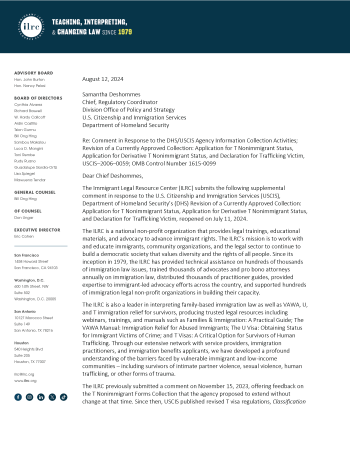
On August 12, 2024, ILRC provided comments to USCIS on proposed changes to the application forms for T Nonimmigrant status. The comment urged USCIS to make additional changes to the form including removing the requirement for disclosure of juvenile adjudications and vacated criminal records and implementing uniform confidentiality and privacy language on the forms to ensure that the applicant’s sensitive information is protected.
Tags: U Visa/T Visa/VAWA
Tags: U Visa/T Visa/VAWA
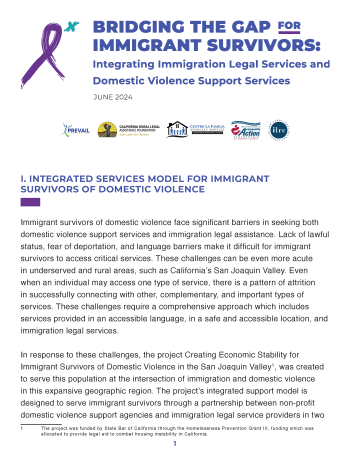
Immigrant survivors of domestic violence face significant barriers in seeking both domestic violence support services and immigration legal assistance. Lack of lawful status, fear of deportation, and language barriers make it difficult for immigrant survivors to access critical services. These challenges can be even more acute in underserved and rural areas, such as California’s San Joaquin Valley. This project aims to fortify the economic stability of immigrant survivors of domestic violence in California’s rural San Joaquin Valley by facilitating access to lawful immigration status, employment authorization, and public benefits for immigrant survivors, thus reducing their risk of poverty and homelessness.
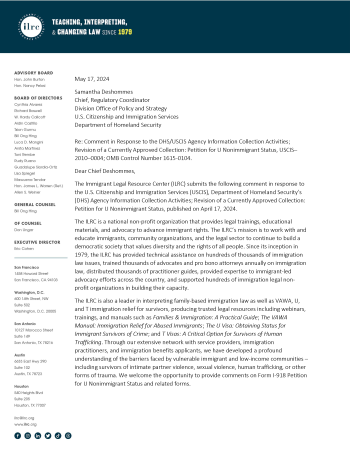
On May 17, 2024, the ILRC provided comment to USCIS on proposed changes to the forms to apply for a U Visa. This is the second time that ILRC provided comment on proposed changes and USCIS accepted some of our previous comments in the newest version. We reiterated some previous requests in response to the agency’s changes and also requested that USCIS extend grace periods for the old forms to mitigate the harm to applicants who would have had to get new law enforcement certifications on new forms, which USCIS granted.
The U.S. immigration system treats children and young people differently than adults. It is important to understand how your age may impact your options for seeking relief or protection against deportation. This Community Explainer highlights how age impacts eligibility for certain forms of immigration relief, how immigrant youth can help themselves and their family members, and how to learn more.
If you are undocumented and have been a victim of a crime, served as a witness for law enforcement, or have been subject to human trafficking, you may be eligible to apply for certain forms of immigration status. These are known as U, T, and S visas. In most cases, the application process for these visas will require help from a law enforcement agency. This Community Explainer details how a new California law, AB 1261, aims to better protect immigrants who are applying for these forms of relief and ensure that California law enforcement agencies help them when needed.
As of April 1, 2024, immigrant survivors of abuse, trafficking, and other crimes can now apply for certain immigration benefits for free. This Community Explainer details which survivor-based benefits are covered by the new fee exemptions, as well as other changes that may reduce financial barriers to accessing immigration benefits.
